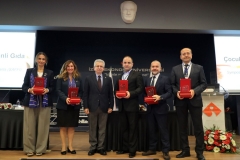
VOCATIONAL SCHOOL OF HEALTH SERVICES
Department of Child Development
CG 205 | Course Introduction and Application Information
| Course Name |
Child and Drama
|
|
Code
|
Semester
|
Theory
(hour/week) |
Application/Lab
(hour/week) |
Local Credits
|
ECTS
|
|
CG 205
|
Fall
|
2
|
2
|
3
|
5
|
| Prerequisites |
None
|
|||||
| Course Language |
Turkish
|
|||||
| Course Type |
Required
|
|||||
| Course Level |
Short Cycle
|
|||||
| Mode of Delivery | Blended | |||||
| Teaching Methods and Techniques of the Course | Group WorkRole PlayingLecture / Presentation | |||||
| Course Coordinator | ||||||
| Course Lecturer(s) | ||||||
| Assistant(s) | - | |||||
| Course Objectives | The aim of the course is using drama as method in pre-school period and developing practice skills with other methods and techniques. |
| Learning Outcomes |
The students who succeeded in this course;
|
| Course Description | This course covers activities that can be planned using drama in the education of children who are developing normally and differently. |
|
|
Core Courses | |
| Major Area Courses |
X
|
|
| Supportive Courses | ||
| Media and Management Skills Courses | ||
| Transferable Skill Courses |
WEEKLY SUBJECTS AND RELATED PREPARATION STUDIES
| Week | Subjects | Related Preparation |
| 1 | Introduction, Definition and history of drama and its relationship with child's developmental areas | Drama, Editör Tolga ERDOĞAN, Eğiten Kitap Sayfa; 2-41, Okul Öncesi Eğitimde Drama Teoriden Uygulamaya Kitap Sayfa; 29-36 |
| 2 | Intercommunication and Interaction, Intergroup Communication and Interaction | Drama, Editör Tolga ERDOĞAN, Eğiten Kitap Sayfa; 2-41, Okul Öncesi Eğitimde Drama Teoriden Uygulamaya Kitap Sayfa; 29-36 |
| 3 | Sensory Studies / Definition of Drama, Its Components, Basic Concepts | Çocuk ve Drama Kitabı 1-30 İzge Yayıncılık |
| 4 | Relation of Creative Drama with Play, Features of Play, Concepts of Role Playing and Improvisation | Eğitimde Yaratıcı Drama Kitabı Sayfa: 62-64, 355-358 |
| 5 | Techniques in Drama | Çocuk ve Drama Kitabı 67-85 İzge Yayıncılık |
| 6 | Components of Dramatic Fiction | Eğitimdee Yaratıcı Drama Kitabı Sayfa 143-158 (YKY) |
| 7 | Drama as a Teaching-Learning Method | Okul Öncesi Eğitimde Drama Teoriden Uygulamaya Kitap Sayfa; 91-205 Drama Okul Öncesinden İlköğretime Kuramdan Uygulamaya, Eğiten Kitap, Sayfa 109-124 |
| 8 | Midterm | |
| 9 | Creative Drama and Art Education | Okul Öncesi Eğitimde Drama Teoriden Uygulamaya Kitap Sayfa; 91-205 Drama Okul Öncesinden İlköğretime Kuramdan Uygulamaya, Eğiten Kitap, Sayfa 55-70 |
| 10 | Children's Literature and Drama | Drama, Editör Tolga ERDOĞAN, Eğiten Kitap Sayfa; 109-127 |
| 11 | Creating A Lesson Plan With Creative Drama Method, Practice, Discussion and Presentation | Drama, Editör Tolga ERDOĞAN, Eğiten Kitap Sayfa; 109-127 |
| 12 | Creating A Lesson Plan With Creative Drama Method, Practice, Discussion and Presentation | Drama, Editör Tolga ERDOĞAN, Eğiten Kitap Sayfa; 109-127 |
| 13 | Creating A Lesson Plan With Creative Drama Method, Practice, Discussion and Presentation | Drama, Editör Tolga ERDOĞAN, Eğiten Kitap Sayfa; 109-127 |
| 14 | Creating A Lesson Plan With Creative Drama Method, Practice, Discussion and Presentation | Drama, Editör Tolga ERDOĞAN, Eğiten Kitap Sayfa; 109-127 |
| 15 | Examination of The Course | |
| 16 | Final Exam |
| Course Notes/Textbooks | Adıgüzel,Ö. (2018) Eğitimde yaratıcı drama. İstanbul: Yapı Kredi Yayınları Erdoğan, T. (Ed.) (2015). Okul öncesinden ilköğretim kuramdan uygulamaya drama. Ankara: Eğiten Yayıncılık. McCaslin, N. (2016). Yaratıcı drama sınıf içinde ve dışında. (Çev. Ed. P. Özdemir Şimşek). Ankara: Nobel Yayıncılık. Üstündağ, T. (2012). Yaratıcı Drama Öğretmenimin Günlüğü, Ankara: Pegem Yayıncılık. Metinnam, İ., Karaosmanoğlu, G. (2021)Çocuk ve Drama. Ankara: İzge Yayıncılık. |
| Suggested Readings/Materials |
EVALUATION SYSTEM
| Semester Activities | Number | Weigthing |
| Participation |
1
|
5
|
| Laboratory / Application |
1
|
5
|
| Field Work | ||
| Quizzes / Studio Critiques | ||
| Portfolio | ||
| Homework / Assignments |
1
|
20
|
| Presentation / Jury |
1
|
10
|
| Project | ||
| Seminar / Workshop | ||
| Oral Exams | ||
| Midterm |
1
|
20
|
| Final Exam |
1
|
40
|
| Total |
| Weighting of Semester Activities on the Final Grade |
4
|
60
|
| Weighting of End-of-Semester Activities on the Final Grade |
1
|
40
|
| Total |
ECTS / WORKLOAD TABLE
| Semester Activities | Number | Duration (Hours) | Workload |
|---|---|---|---|
| Theoretical Course Hours (Including exam week: 16 x total hours) |
16
|
2
|
32
|
| Laboratory / Application Hours (Including exam week: '.16.' x total hours) |
16
|
2
|
32
|
| Study Hours Out of Class |
14
|
2
|
28
|
| Field Work |
0
|
||
| Quizzes / Studio Critiques |
0
|
||
| Portfolio |
0
|
||
| Homework / Assignments |
1
|
18
|
18
|
| Presentation / Jury |
1
|
15
|
15
|
| Project |
0
|
||
| Seminar / Workshop |
0
|
||
| Oral Exam |
0
|
||
| Midterms |
1
|
15
|
15
|
| Final Exam |
1
|
20
|
20
|
| Total |
160
|
COURSE LEARNING OUTCOMES AND PROGRAM QUALIFICATIONS RELATIONSHIP
|
#
|
Program Competencies/Outcomes |
* Contribution Level
|
||||
|
1
|
2
|
3
|
4
|
5
|
||
| 1 | To have the required contemporary theoretical and practical knowledge in his/her field |
X | ||||
| 2 | To use the material and technology related to his/her field, and make their maintenance, use the information and communication technologies at basic level |
X | ||||
| 3 | To have the competency to recognize the problems in his/her field, analyze them, develop evidence-based solutions and have the ability to share their suggestions with others |
X | ||||
| 4 | To be aware of legal responsibilities, conduct basic studies in her/his field independently |
|||||
| 5 | To communicate with patients, relatives and colleagues properly, comprehensively, honestly and explicitly, transfer his/her thoughts and knowledge through written and oral communication |
|||||
| 6 | To take responsibility as an active team member during the practices in his/her field |
X | ||||
| 7 | To commentate and evaluate the scientific information with a critical approach by the help of knowledge gained in his/her field |
|||||
| 8 | To comprehend the importance of lifelong learning, to determine and meet her/his learning needs, to develop herself/himself by monitoring the development in science and technology |
|||||
| 9 | To act by considering the universal ethical values, social and cultural characteristics |
|||||
| 10 | To know the concepts of occupational safety, patient safety, environmental protection and quality, and fulfill the requirements |
|||||
| 11 | To be able to follow information in his field and communicate with colleagues in English at least a level of European Language Portfolio A2 General Level |
|||||
| 12 | To have the skills of improving the development and learning of children with special needs |
|||||
| 13 | To plan and carry out activities for development of people under their responsibility |
X | ||||
*1 Lowest, 2 Low, 3 Average, 4 High, 5 Highest


